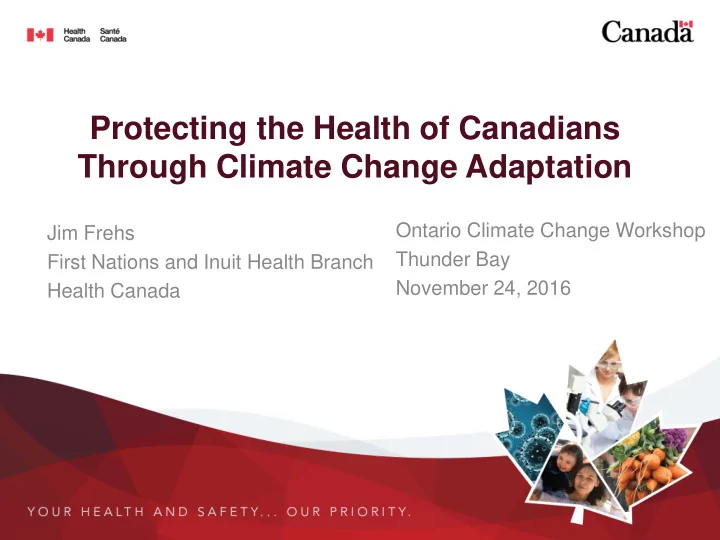

Protecting the Health of Canadians Through Climate Change Adaptation Ontario Climate Change Workshop Jim Frehs Thunder Bay First Nations and Inuit Health Branch November 24, 2016 Health Canada
Greatest Health Risk of the 21 st Century http://www.thelancet.com/climate-and- health
“Indigenous, local, and traditional knowledge systems and practices, including indigenous peoples’ holistic view of community and environment, are major resource for adapting to climate change, but these have not been used consistently in existing adaptation efforts. Integrating such forms of knowledge with existing practices increases the effectiveness of adaptation.” IPCC 2014
Multiple, Wide Ranging, Interactive Impacts 4
Luber et al., 2014
Provinces and territories will continue to face climate change and health risks. Examples include: Northern Territories • Food security • Water-borne contamination Atlantic Canada • Coastal erosion • Dangerous travel • Water-related morbidity • Cultural impacts • Hurricanes • Vector-borne diseases • Flooding Prairies • Drought Quebec • Extreme temperatures • Urban heat island effect • Flooding • Air quality – smog and • Wildfires British Columbia aeroallergens • Mental health impacts • Coastal erosion • Vector-borne diseases • Lyme disease • Storm surges • Wildfires • Wildfires • Cryptococcus gattii Ontario • Extreme heat • Storms (ice, wind) • Lyme disease • West Nile Virus • Air quality Preliminary Thinking 6 • UV radiation - Climate Change
What is going on in Northern Ontario • Spread of infectious disease such as Lyme and West Nile Virus cause increased health risks, losses in productivity due to illness and higher treatment costs • Warming water and air leads to changes to traditional foods and risks food security • Loss of ice roads can lead to health risks from food and energy security as well as the health hazards associated with risky travel conditions • Increased forest fires leads to poorer air quality and increased respiratory issues as well as evacuations • Extreme weather events such as ice and wind storms can lead to mortalities • Metal health concerns related to above risks such as PTSD, knowledge of future risks and economic security 7
How do we adapt to climate health risks Health Canada has successfully applied a collaborative, capacity- building model to increase resilience Addressing to climate change-related health risks. knowledge gaps Capacity Building Tools Development Network of Champions 8
Supported 95 First Nations and Inuit community- driven adaptation projects in North Healthy Resilient Communities
History of the CCHAP
What does this mean for Indigenous populations Lessons learned from the northern CCHAP Adaptation increasingly requires a multidisciplinary approach Importance of integration of scientific and Traditional Knowledge Community-led research moves quickly to action The more resilient a community the better prepared it is to adapt to climate change Climate change exacerbates existing conditions
THANK YOU jim.frehs@hc-sc.gc.ca
Recommend
More recommend